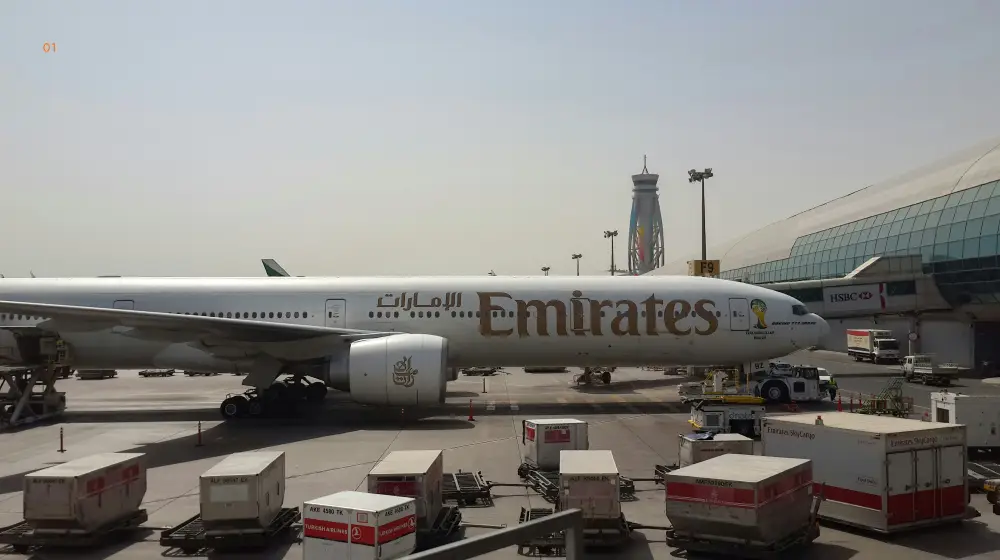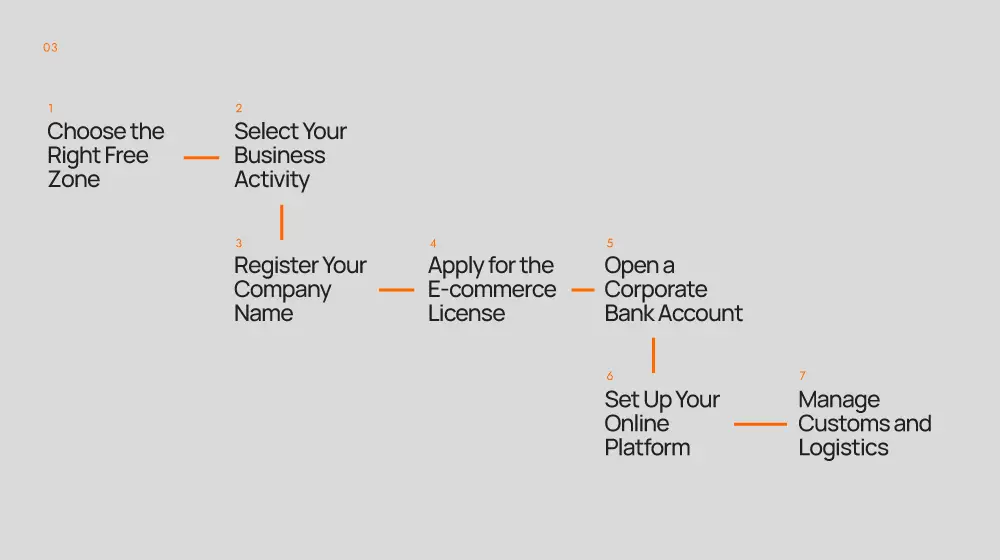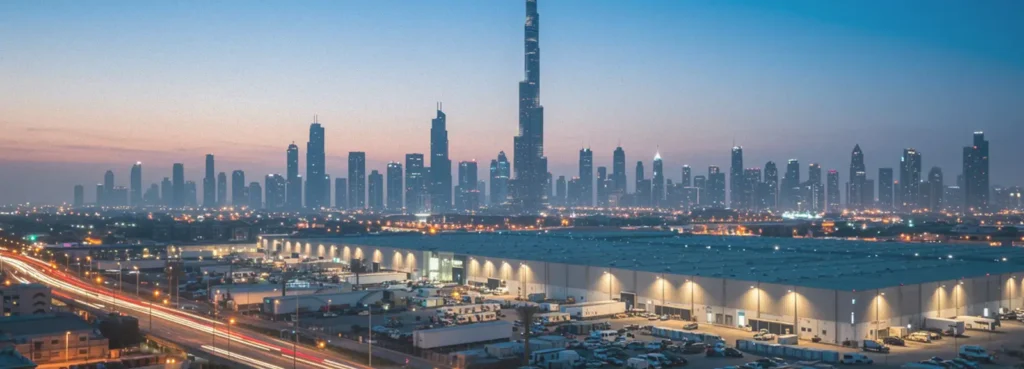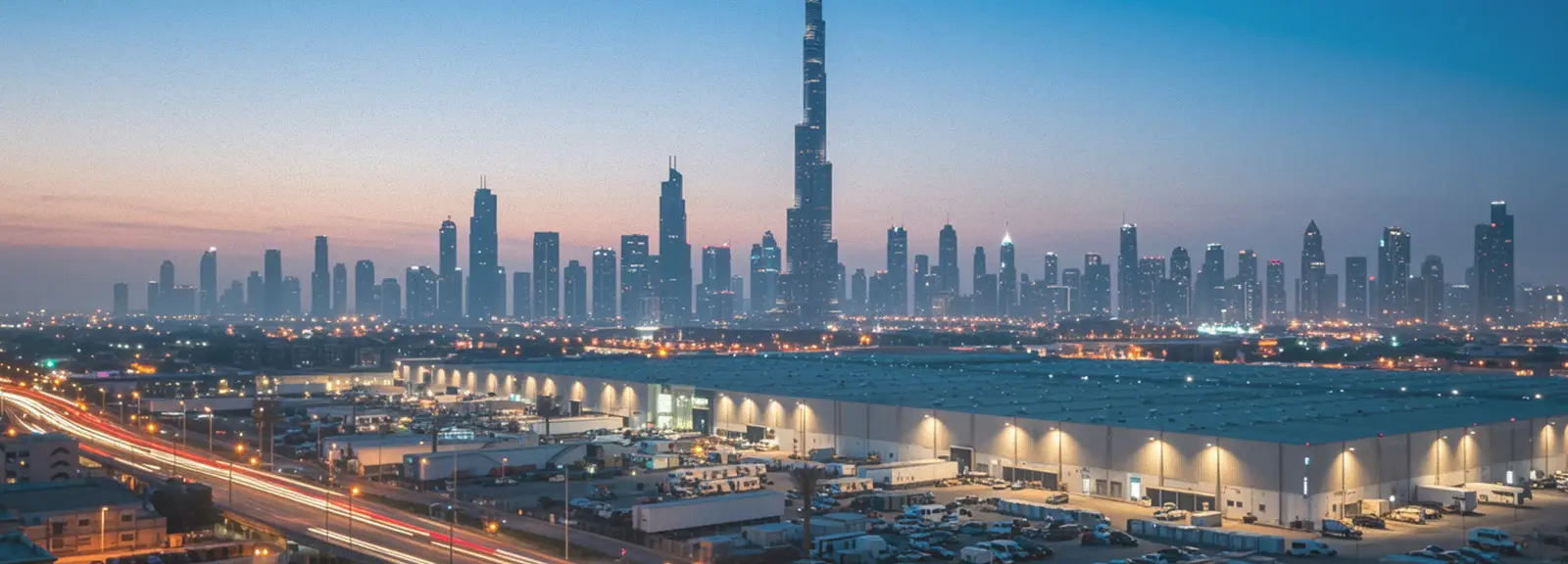If you’re planning to build or expand your online business in the UAE, understanding which free zone best fits your e-commerce goals is crucial. Dubai has become one of the most strategic locations for e-commerce companies looking to scale globally, thanks to its digital infrastructure, tax benefits, and strong logistics network.
In this blog, we’ll explore why Dubai remains one of the best destinations for online entrepreneurs in 2025, what free zones are and how they work for e-commerce businesses, and what factors you should consider before choosing one. You’ll also get a detailed breakdown of the best free zone for ecommerce in Dubai, setup costs, timelines, and the entire registration process. Finally, we’ll touch on common mistakes that new founders make when setting up an ecommerce business in Dubai free zone and how to avoid them.
Table of Contents
Why Choose Dubai for E-commerce in 2025

Dubai’s e-commerce sector has evolved into one of the most advanced markets in the Middle East, attracting both startups and global brands. In 2025, it’s not just about location anymore, it’s about access, infrastructure, and policy support. That’s what makes Dubai stand out as the best free zone for ecommerce in Dubai and across the UAE.
The UAE e‑commerce market reached USD 7.5 billion in 2023 and is projected to exceed USD 13.3 billion by 2028.
A Strategic Global Hub
Dubai’s geographic position between Europe, Asia, and Africa gives e-commerce businesses direct access to more than 2.5 billion consumers within a few hours of flight time. Its world-class airports, seaports, and digital infrastructure make order fulfillment faster and more reliable than ever before. For online sellers looking to expand regionally or globally, this is a major advantage.
Strong Government Support for E-commerce
The UAE government continues to push digital transformation and trade facilitation. With initiatives like the Dubai Economic Agenda and the UAE Digital Economy Strategy, e-commerce licensing and cross-border trade are becoming easier than ever. This means businesses setting up in an ecommerce free zone Dubai can operate with less bureaucracy and more efficiency.
Tax Benefits and 100% Ownership
One of the main reasons investors call Dubai the best free zone in Dubai for online business is because of its tax-friendly environment. Free zones allow 100% foreign ownership, no personal income tax, and zero import or export duties on most goods. For e-commerce founders, that means higher profit margins and fewer restrictions on repatriating capital.
Access to Talent and Logistics
Dubai attracts global talent across marketing, logistics, technology, and finance. Combined with advanced logistics networks and last-mile delivery solutions, running an ecommerce business setup in Dubai becomes seamless, especially for brands that rely on speed and customer experience.
Future Growth Outlook
By 2025, Dubai is expected to remain the best free zone for ecommerce in Dubai due to ongoing investments in AI, fintech, and logistics infrastructure. The city’s continued focus on digital trade and innovation ensures that e-commerce companies can scale quickly and efficiently, backed by stable policies and an expanding consumer base.
Understanding Free Zones and E-commerce Licenses
To find the best free zone for ecommerce in Dubai, it helps to understand how Dubai’s free zones operate and why they’re ideal for online businesses.
A free zone is a designated area that offers full foreign ownership, simplified registration, and tax advantages. Each zone has its own authority that issues licenses, regulates activities, and provides business facilities like offices, warehouses, and fulfillment centers.
How Free Zones Support E-commerce
Free zones make international trade easier. For e-commerce companies, this means faster customs clearance, efficient import-export processes, and direct access to logistics hubs connected to Dubai’s ports and airports. That’s why many consider them the best free zone in UAE for ecommerce when scaling across borders.
For physical product sellers, free zones simplify storage and distribution. For digital sellers, they offer virtual offices and flexible licensing that lower startup costs. This is a big factor when comparing ecommerce license Dubai free zone cost.
What Is an E-commerce License?
An e-commerce license legally allows you to sell products or services online in Dubai. Depending on your business type, you can apply for a:
- Trading License (for physical goods)
- Service License (for online services or digital platforms)
- General Trading License (for multiple product categories)
Each free zone has its own licensing structure, but all support a smooth ecommerce business setup in Dubai.
Benefits of a Free Zone E-commerce License
A free zone license gives you 100% ownership, zero customs duty on re-exports, simplified VAT processes, profit repatriation, and flexible visa options. Many free zones also provide modern co-working spaces and warehouses tailored for online businesses.
Key Factors to Consider When Choosing a Free Zone for E-commerce

Finding the best free zone for ecommerce in Dubai depends on more than price or location. Each free zone operates differently, and choosing the right one determines how efficiently your business runs.
1. Business Activity and License Type
Make sure the free zone supports your e-commerce model. Some specialize in product trading, others in digital services. The right match ensures a smoother ecommerce business setup in Dubai.
2. Cost of Setup and Renewal
Compare the ecommerce license Dubai free zone cost, including setup and renewal fees. Packages can range from AED 6,000 to AED 12,000 for small setups to higher tiers with office and visa options. If you’re on a budget, the cheapest free zone for ecommerce in Dubai can help minimize startup costs, but confirm what’s included before committing.
3. Location and Logistics Access
Pick a free zone near airports, ports, or fulfillment centers. Proximity to logistics hubs speeds up delivery and import-export processes, especially for businesses managing large order volumes.
4. Infrastructure and Facilities
Choose a zone with reliable logistics, warehouses, and digital systems. For online-only sellers, virtual offices and co-working spaces help cut costs while keeping operations compliant.
5. Visa Quota and Office Requirements
Check visa limits and office requirements before applying. Some zones offer remote or flexi-desk options, while others require physical offices for each visa.
6. Reputation and Support
The best free zone in Dubai for online business is one that handles registration, renewals, and compliance quickly. Responsive customer service and clear communication make setup easier.
Best Free Zones in Dubai for E-commerce in 2025
Choosing the best free zone for ecommerce in Dubai depends on your business goals, budget, and setup timeline. Below are some of the top-performing ecommerce free zones in Dubai for 2025 that consistently attract online businesses.
Dubai CommerCity
Dubai CommerCity is the first dedicated ecommerce free zone in Dubai, offering modern infrastructure, streamlined licensing, and fulfillment solutions. It is considered one of the best free zones for ecommerce in Dubai for online retailers looking to scale quickly with logistics and warehousing support.
Dubai Multi Commodities Centre (DMCC)
DMCC remains one of the best free zones for ecommerce in Dubai for businesses seeking flexible licensing, excellent global connectivity, and access to international markets. Its digital infrastructure also supports cross-border e-commerce operations efficiently.
Dubai Silicon Oasis (DSO)
DSO is a strong option for tech-driven ecommerce business setup in Dubai, offering affordable office spaces, integrated communities, and advanced IT infrastructure. Startups and SMEs often consider it among the best free zones for ecommerce in Dubai due to low operational costs and fast setup timelines.
Jebel Ali Free Zone (JAFZA)
For large-scale ecommerce logistics, JAFZA provides access to Jebel Ali Port and Al Maktoum International Airport. Its infrastructure supports bulk storage, product distribution, and fast shipping across the GCC, making it one of the best free zones for ecommerce in Dubai for high-volume sellers.
Meydan Free Zone
Meydan offers one of the cheapest free zones for ecommerce in Dubai while still being recognized as a practical choice among the best free zones for ecommerce in Dubai. It allows 100% remote business setup and is ideal for entrepreneurs seeking a cost-effective entry point without physical office requirements.
Cheapest Free Zone for E-commerce in Dubai (Budget-Friendly Options)
If you’re starting small or testing the market, choosing the cheapest free zone for e-commerce in Dubai can help you minimize setup costs while maintaining flexibility. Several budget-friendly ecommerce free zones in Dubai offer competitive packages for startups and online retailers.
Meydan Free Zone
Meydan Free Zone is one of the most affordable options for ecommerce business setup in Dubai. Entrepreneurs can register their companies remotely, access a prestigious Dubai address, and enjoy 100% foreign ownership… all without physical office costs.
IFZA Dubai (International Free Zone Authority)
IFZA provides a straightforward, cost-effective setup process with flexible license packages tailored for small ecommerce ventures. It’s known for its quick registration process and minimal documentation requirements.
Sharjah Media City (Shams Free Zone)
Although located outside Dubai, Shams Free Zone is a popular choice among ecommerce startups for its affordability and easy online registration. It’s suitable for entrepreneurs who want to reduce operational expenses while maintaining access to the UAE market.
Dubai Silicon Oasis (DSO)
For startups with tech-focused operations, DSO combines low setup costs with high-quality infrastructure. It offers strong connectivity and access to ecommerce-friendly facilities, making it a good mid-range option for budget-conscious founders.
Step-by-Step: E-commerce Business Setup Process in Dubai Free Zone

Starting an ecommerce business in a Dubai free zone is a straightforward process once you understand the key steps involved. Here’s how it typically works:
Step 1: Choose the Right Free Zone
Select the best free zone for ecommerce in Dubai based on your business model, target market, and budget. Each zone offers different benefits, such as warehousing, logistics access, or digital infrastructure.
Step 2: Select Your Business Activity
Define your ecommerce activity: such as online retail, dropshipping, or digital services. Your license type will depend on this choice.
Step 3: Register Your Company Name
Submit your trade name for approval. It must comply with UAE naming regulations and reflect your brand or products clearly.
Step 4: Apply for the E-commerce License
Submit your application along with the required documents (passport copy, business plan, and proof of address). Once approved, you’ll receive your ecommerce license to operate legally.
Step 5: Open a Corporate Bank Account
With your license in hand, open a business bank account in the UAE to manage payments, expenses, and client transactions securely.
Step 6: Set Up Your Online Platform
Build your ecommerce website or partner with a marketplace platform. Ensure your payment gateway is UAE-compliant and supports multiple currencies.
Step 7: Manage Customs and Logistics
If you’re selling physical goods, register with Dubai Customs and coordinate with a logistics provider for smooth import and delivery operations.
Timeline for E-commerce License Setup (2025)
The timeline for ecommerce business setup in Dubai free zones varies depending on the chosen authority and documentation readiness. In 2025, most free zones have fully digital registration processes, making setup faster and more efficient. Choosing the best free zone for ecommerce in Dubai can also influence how quickly your license is approved.
Typical Setup Duration
On average, obtaining an ecommerce license in a Dubai free zone takes between 3 to 10 working days. Some zones, such as Meydan Free Zone and IFZA Dubai, offer same-week approvals if all documents are in order. Selecting the best free zone for ecommerce in Dubai ensures a smoother and faster process.
Factors Affecting the Timeline
- Document verification: Delays can occur if passport or address proofs require additional validation.
- Business activity type: Complex ecommerce models involving import/export or logistics may require extra approvals.
- Free zone efficiency: Some free zones have faster processing systems and integrated online portals, which can shorten the timeline.
Post-License Setup
After receiving your ecommerce license in a Dubai free zone, the next steps are opening a business bank account and setting up your online platform, including website development, payment gateways, and inventory or order management. If your business involves physical products, coordinating with logistics partners and registering with Dubai Customs is also necessary. Completing these steps promptly ensures your ecommerce business setup in Dubai free zone is ready to operate efficiently, especially when you choose the best free zone for ecommerce in Dubai for your operations.
Common Mistakes to Avoid When Setting Up E-commerce in a Free Zone

Setting up an ecommerce business in a Dubai free zone can be straightforward if done correctly. However, many entrepreneurs make avoidable mistakes that can delay operations, increase costs, or affect compliance. Understanding these pitfalls can help you choose the best free zone for ecommerce in Dubai and set up efficiently.
1. Choosing the Wrong Free Zone
Selecting a free zone without matching it to your business model is a common error. Some zones are better for product-based ecommerce, while others cater to digital services. Choosing the right zone ensures your ecommerce business setup in Dubai free zone aligns with logistics, licensing, and expansion needs.
2. Underestimating Setup Costs
Many startups overlook fees such as license renewal, office space, and visa costs. Comparing the ecommerce license Dubai free zone cost across zones helps you find the cheapest free zone for ecommerce in Dubai without compromising on essential services.
3. Ignoring Licensing Requirements
Applying for the wrong type of license can cause delays or legal issues. Ensure your business activity matches your license category, whether trading, services, or general trading. Correct licensing from the start positions you in the best free zone for ecommerce in Dubai for long-term compliance.
4. Overlooking Visa and Office Regulations
Each free zone has different requirements for office space and visa allocations. Failing to comply can result in fines or operational delays. Confirm office, desk, and visa needs during your ecommerce business setup in Dubai.
5. Skipping Logistics and Customs Planning
For businesses selling physical goods, not integrating logistics and customs processes early can slow deliveries and increase costs. Partnering with experienced providers ensures smooth operations in any ecommerce free zone Dubai.
6. Neglecting Post-License Steps
Even after receiving your license, failing to open a corporate bank account, set up payment gateways, or integrate inventory management can delay operations. Completing these steps promptly ensures your ecommerce business setup in Dubai free zone is fully functional.
Conclusion

Choosing the best free zone for ecommerce in Dubai is essential for establishing a successful online business. Understanding options, costs, timelines, and infrastructure, while avoiding common mistakes, ensures a smooth and compliant ecommerce business setup in Dubai free zone.
From dedicated hubs like Dubai CommerCity to budget-friendly options like Meydan Free Zone, Dubai offers a variety of ecommerce free zones in Dubai for different business models. Considering license type, office requirements, visa quotas, and logistics access helps you select the zone that fits your goals.
Proper planning also ensures your ecommerce license Dubai free zone cost is optimized and operations run efficiently from day one. GCG Structuring can guide you in choosing the best free zone for ecommerce in Dubai, managing setup processes, and ensuring compliance so you can focus on growing your online business.
FAQ
1. 0 What is the best free zone for ecommerce in Dubai?
Dubai CommerCity, DMCC, and Dubai Silicon Oasis are among the best free zones for ecommerce in Dubai.
2. 0 How much does an ecommerce license cost in a Dubai free zone?
The ecommerce license Dubai free zone cost ranges from AED 6,000 to 12,000 depending on the zone and services.
3. 0 How long does it take to set up an ecommerce business in a free zone?
Ecommerce business setup in Dubai free zone usually takes 3–10 working days.
4. 0 Can I operate remotely in a Dubai free zone?
Yes, zones like Meydan and IFZA allow 100% remote ecommerce business setup in Dubai free zone.
5. 0 Do I need a physical office for ecommerce setup?
Some zones require offices, while others allow virtual setups, making them convenient for the best free zone for ecommerce in Dubai.





